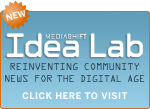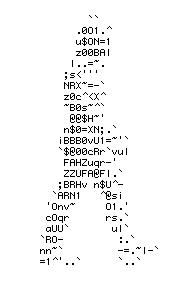Sehr interessante Keynote von
Martin Nisenholtz, Chief Executive Officer -
New York Times Digital anlässlich des 2004 Information Industry Summit
Software & Information Industry Association (SIIA) zum Thema "Electronic Publishing":
We can all see the vague outlines of several elements coming increasingly into focus. These include:
Infrastructure that allows millions of ordinary users to access a broad array of media types, from simple text to video and animation. This infrastructure includes broadband and very powerful personal computing devices.
Dramatic consumer behavior shifts – both at home and in the office – placing connected devices in the center of the consumer's day. A control shift from the center to the edges of the network. An increasing willingness to pay for content online.
A whole array of creation technologies – from low-cost, digital video to widely available, advanced publishing platforms – that enable new ideas and formats to bubble-up, initially in the hands of amateur bloggers, but over time subsumed by a new professional class.
On the other end, core infrastructure that greatly enhances the user experience, including inexpensive, highly portable, very powerful networked devices.
Profitable Phase II content businesses like ours, populated with people who have new competencies and resources to support experimentation among a professional class of collaborating colleagues.
Eine grundsätzlich sehr weitsichtige und auch "einsichtige" Vision von Martin Nisenholtz,....die manche Print-Journalisten einmal mehr nicht verstehen
wollen werden. (Nur was er denn mit "in the hands of amateur bloggers, but over time subsumed by a new professional class" wohl konkret gemeint hat? Blogende Journalisten oder journalistisch arbeitende Blogger?)
Hier gibt's den vollständigen Vortrag von Martin Nisenholtz zum Nachlesen:
The Pong of Electronic Publishing
Interessant in diesem Zusammenhang ein Artikel von Larry Pryor mit ähnlichen "Voraussagen",....allerdings bereits vor 2 Jahren veröffentlicht.(!!),....
The Third Wave of Online Journalism (26.04.2002):
"We have to engage in a conversation with our audience. … We look at what users are doing and use it to inform how our product develops."
-- Stephen Newman, deputy general manager, nytimes.com
"Involve the community - make people part of the (news) organization."
-- Jane Ellen Stevens, multimedia instructor, UC Berkeley Graduate School of Journalism
"Give them what they want and give them value."
-- Julie Weber, digital media manager, Hearst Newspapers
News organizations online are increasingly realizing that the key to success lies in giving readers what they want, when they want it. That means churning out news on more than a once-daily deadline, respecting privacy, creating interactivity, giving readers options and control. Many of these demands -- especially the need for more constant news updates -- mean major changes in the way newsrooms work. Many organizations are working to meet the needs of this new online audience.
[Via:
Rich Gordon - The Third Phase of Electronic Publishing ]




















